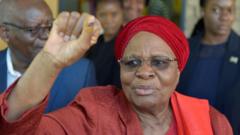Namibia has made history with the election of its first female president, Netumbo Nandi-Ndaitwah, who has served as vice-president since February. Emerging with over 57% of the votes in a recently held election, Nandi-Ndaitwah, from the governing South West Africa People's Organisation (Swapo), faces significant opposition following claims of electoral malpractice from her closest rival, Panduleni Itula, who represents the Independent Patriots for Change (IPC).
While the electoral commission announced that Nandi-Ndaitwah received 57% of the votes compared to Itula's 26%, logistical difficulties during the polling process and a three-day extension in some regions raised questions about the election's integrity. In protest, Itula declared that his party would not acknowledge the results, prompting a boycott by several opposition parties from the announcement event in Windhoek, as reported by The Namibian newspaper.
Nandi-Ndaitwah responded to her victory by emphasizing that “the Namibian nation has voted for peace and stability,” a sentiment echoed by Swapo party supporters. Having held significant positions in government for over 25 years, Nandi-Ndaitwah is viewed as a reliable leader within her party, which has maintained power in Namibia since its independence in 1990.
With this election, Nandi-Ndaitwah will join the ranks of African female leaders, currently represented solely by Tanzania's Samia Suluhu Hassan. However, the ongoing disputes may overshadow her entry into this exclusive group. Itula, a trained dentist, previously made strides in reducing Swapo's popularity during the 2019 presidential election, and he plans to challenge the election results legally.
As Swapo continues to navigate this transitional period, observers note the broader implications for liberation parties in the region, particularly as similar entities like South Africa’s African National Congress and the Botswana Democratic Party have recently faced electoral setbacks. Alongside this electoral dispute, issues such as Namibia's foreign policy decisions, like blocking a ship over concerns related to the Israel conflict, spotlight the intricate dynamics shaping the nation’s future.
The unfolding situation poses critical questions regarding electoral integrity and governance in Namibia, particularly as it embarks on a new chapter under its historic female presidency.



















